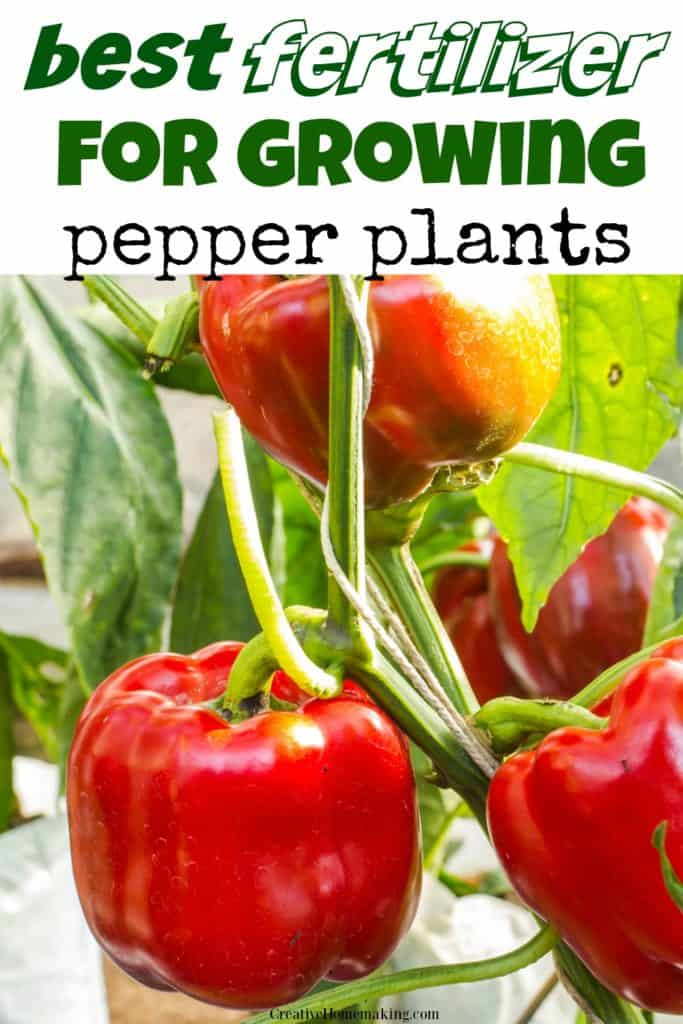Discover the Best Fertilizers for Peppers: Necessary Nutrients for Growing Plants
Discover the Best Fertilizers for Peppers: Necessary Nutrients for Growing Plants
Blog Article
Organic Vs. Synthetic Fertilizers: Which Is Best for Nurturing Healthy And Balanced Pepper Plants?
In the world of nurturing healthy and balanced pepper plants, the selection between natural and synthetic plant foods stands as a crucial decision with significant implications. While both options goal to offer important nutrients to sustain plant development, the nuances of their effect on the soil, plant health, and the atmosphere trigger a dispute that mirrors throughout the horticulture area. Understanding the distinctive benefits and prospective risks of each plant food kind is critical for pepper growers seeking to enhance their returns while maintaining an eco-conscious and lasting approach.
Benefits of Organic Plant Foods
Organic fertilizers use an environmentally-friendly and lasting technique to beneficial pepper plants, offering vital nutrients without using synthetic chemicals. These all-natural fertilizers are stemmed from organic resources such as compost, manure, bone dish, and algae, promoting dirt health and wellness and biodiversity. Unlike synthetic plant foods, organic options release nutrients gradually, making certain a balanced and stable supply for pepper plants to grow.
One considerable benefit of natural plant foods is their capability to improve soil framework and water retention. By enhancing soil health and wellness, organic plant foods promote helpful microbial task, which helps in nutrient uptake by pepper plants. Additionally, natural plant foods decrease the threat of chemical run-off, protecting water resources from pollution and protecting the environment.
Furthermore, organic plant foods add to long-lasting dirt fertility by promoting the growth of valuable dirt organisms. These microorganisms aid break down natural issue, releasing nutrients in a type that is easily available to pepper plants. best fertilizers for peppers. By cultivating a healthy dirt community, organic fertilizers sustain sustainable pepper growing techniques that profit both plants and the environment
Disadvantages of Artificial Plant Foods
Synthetic plant foods, in comparison to their natural counterparts, present numerous downsides when used to nourish pepper plants, affecting both plant health and environmental sustainability. One significant disadvantage of artificial fertilizers is their tendency to seep nutrients from the dirt swiftly.
In addition, the overuse of synthetic fertilizers can contribute to water air pollution. Excess plant foods not soaked up by plants can get rid of into water bodies, causing eutrophication, where algae blossoms diminish oxygen levels in the water, damaging water life. Furthermore, synthetic fertilizers are commonly stemmed from non-renewable sources, such as fossil gas, adding to carbon emissions and environmental destruction throughout their production.
Nutrient Absorption Comparison
When contrasting natural and artificial fertilizers in terms of nutrient absorption, organic plant foods have the benefit of giving a more well balanced and slow-release resource of nutrients. Organic plant foods consist of a selection of macro and trace elements that are not only advantageous for the plants yet also advertise healthy and balanced soil microbial task, which helps in nutrient uptake.
Additionally, natural plant foods boost dirt structure and water retention capability, permitting pepper plants to gain access to nutrients more effectively. This enhanced soil high quality assists in origin advancement, allowing far better nutrient absorption. Synthetic plant foods, although at first increasing plant growth because of their high nutrient concentrations, might impede lasting nutrient absorption by degrading dirt health and wellness in time.
Ecological Effect Factors To Consider

On the other hand, artificial plant foods, although commonly more focused and instantly offered to plants, can have detrimental results on the atmosphere otherwise used correctly (best fertilizers for peppers). Their production calls for moved here high power inputs, bring about greenhouse gas emissions and adding to environment change. Furthermore, the drainage of excess artificial fertilizers can infect water resources, bring about eutrophication and hurting aquatic ecosystems.
Ideal Plant Food Practices for Peppers
When fertilizing pepper plants, maximizing nutrient uptake and lessening environmental influence are key considerations. To accomplish this, it is vital to adhere to finest plant food methods tailored to the certain needs of pepper plants. One important method is to perform a soil test before using any kind of plant foods. This examination can establish the pH level of the soil and identify any kind of nutrient shortages, assisting you in picking the most appropriate plant food formula.
One more crucial method is to feed pepper plants at like this the correct time. Generally, peppers take advantage of obtaining plant food at growing and afterwards once again when they begin to flower. Over-fertilizing can lead to nutrient inequalities and harm the plants, so it is important to adhere to suggested application rates.
In addition, picking a balanced plant food with an NPK ratio that suits pepper plants' demands is fundamental. Organic fertilizers, such as garden compost or manure, can be excellent choices as they release nutrients slowly and enhance dirt framework gradually. Synthetic fertilizers can provide a quick nutrient boost when needed. Ultimately, combining organic and synthetic fertilizers deliberately can assist nurture healthy and balanced pepper plants while reducing environmental impact.
Verdict

Organic plant foods use a sustainable and environmentally-friendly strategy to nourishing pepper plants, giving necessary nutrients without the use of synthetic chemicals. Unlike artificial fertilizers, natural choices launch nutrients slowly, making certain a constant and balanced supply for pepper plants to flourish.
Artificial fertilizers, in contrast to their organic counterparts, posture various disadvantages when useful link utilized to nurture pepper plants, affecting both plant wellness and ecological sustainability. When comparing synthetic and natural plant foods in terms of nutrient absorption, organic fertilizers have the advantage of supplying a more balanced and slow-release source of nutrients.Moreover, organic plant foods improve soil structure and water retention capability, permitting pepper plants to accessibility nutrients more successfully.
Report this page